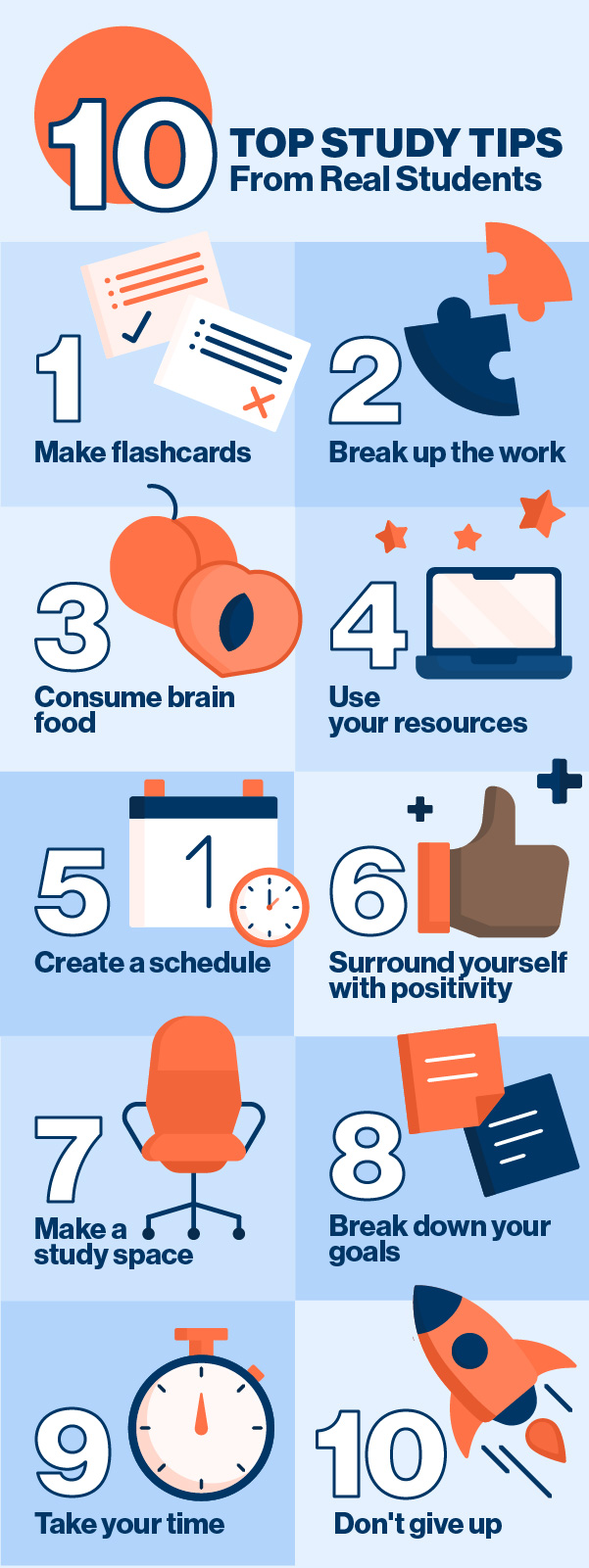
10 Study Tips from Real Students (Study Guide)
Sep 25, 2024
8 min read
Whether it be focus, retaining the information, or avoiding distractions, studying can sometimes be a difficult task. When studying for exams in online school, it can seem even more difficult because there’s a lot of self-discipline required. That doesn’t mean it’s impossible to get the job done, however. Here are some study tips, as well as insight from real online students and instructors, you can use to help you prepare for your exams.

1. Make flashcards
Many people find flashcards beneficial when studying. They’re a way to focus on just the material in front of you so you’re not overwhelmed. Penn Foster Veterinary Technician graduate Coty Feest shares, “I found flashcards really helped me. Study. … really push yourself and don't use the book. Close that book up. Push yourself to not look for any easy route; really challenge yourself to close that book and take that test and see where you're at in your studies. That way those proctored exams are going to show you how well you're doing."
Read more: How High School Math & English Help Students Succeed
2. Break work up
Reviewing everything you need to know at once can be overwhelming and ultimately counterproductive. It’s best to study in small increments, such as for 45 minutes, then take a 15-minute break, then study for another 45 minutes. If you try to absorb too much information in one sitting it won’t all stick and you likely won’t remember everything you need to when it comes time to sit down for your exam.
One Penn Foster student shared on social media that they break it up even further! They suggest setting study and break times – for example, studying for 20 minutes and then taking a five-minute break. You can set alarms to help with this as well!
Read more: 15 Tips for Online Learning (Your Guide to Taking Online Classes)
3. Consume brain food
You may crave chips or cookies or other comfort food when studying for a difficult exam, but it’s actually worth your while to eat some healthy snacks while studying. Shawna Burke, a Licensed Veterinary Technician and Veterinary Technologist who has 17 years of experience as an educator, explains, “Having healthy snacks stimulates the parasympathetic nervous system. When students are eating something or snacking on something while they're studying, it also puts their brain into a state to receive the information better.”
4. Take advantage of available resources
There’s the study material for the course and your own notes, but your program often offers other resources you can use to help you prepare for your exams. Everyone learns differently, so simply reading through study guides may not work for you. Many courses at Penn Foster, for example, have webinars, which act essentially as lectures from instructors on certain courses or lessons. Vet Tech graduate Hannah Rodgers shares, "One of the first things I wish I had known was about those lectures because I didn't find those out until later on... but once I found them, I started listening to them on my way to work or whenever I had free time."
Read more: Penn Foster Exams and Grading Explained
5. Create a schedule
Routine can make a world of difference when trying to organize daily tasks. If you build studying into your everyday schedule you’ll be able to keep up with schoolwork and feel prepared for your exams.
Penn Foster High School graduate Angelica Mosqueda found making time for school on a regular basis beneficial. “At first, I did procrastinate a lot…but I would still find time throughout my days to sit down, study the material, and get ready for the quizzes we have at the end of every module. Over time I started developing a schedule, like I’ll work on it from this time to this time, take a break, then do a little more in the evening.”
6. Surround yourself with positivity
You may be surprised how much positive vibes can impact how well you do in school. Negative energy can seep into your confidence and you may find yourself making mistakes or not meeting your potential. Allowing yourself to think about school and your abilities positively, as well as allowing positive energy into your life, can help you succeed.
Lauren Campion, another Veterinary Technician graduate, explains more: "It’s all about your support people around you and how dedicated you are. So, if you got your support people and you just keep a plan and just realize that even if you can’t finish what you plan to do, just try again the next day or the next week."
Read more: How Mental Health Can Affect Your Grades & Academic Performance
7. Have a designated study space
It’s important when studying to minimize distractions. Creating a designated study space away from the television or other family members can help you keep your focus on school when doing schoolwork. You can even decorate this space with items that motivate you. If it’s not feasible to create a space in your own home, the library is a great option!
Some Penn Foster students on social media shared what worked for them. Two students suggest a quiet space, while others suggest listening to calming music while you study. Your study space and vibe can be whatever works best for you!
Read more: The Benefits of Organized Chaos at Work and in School
8. Make small goals
Big goals are important, but they can also be overwhelming and stressful. Break your ultimate goal of graduating and earning your diploma or degree up into smaller goals. You can write these goals down so you can then cross them off each time you achieve one. Pass an exam? Check! Complete a course? Check!
Achieving small goals helps you feel the progress you’re making towards your ultimate goal and allows you that sense of pride to shine. As one social media commenter and online student said, simply create a plan and stick to it!
Read more: Does Education Make a Difference in Salary? (How Learning More May Help You Earn More)
9. Take your time
Everyone learns at their own pace, and it’s okay to go slow if that’s what works for you. One of the biggest appeals of online schools is the ability for students to move at their own pace. Deadlines are great for many people who work well under pressure, but not everyone does and having the flexibility to take your time can make all the difference in your education journey.
Shawn Cherinchak, English instructor at Penn Foster High School, emphasizes the importance of taking your time. "My biggest piece of advice is to go slowly, take your time with it. Read the directions carefully and then just do your best."
10. Don’t give up
School can be incredibly challenging, but it’s important not to give up on your academic goals. All of the hard work you put in will be worth it in the end when you have that diploma, certificate, or degree to put on your resume. You also may inspire other people in your life who see you succeed and decide to reach for their dreams as well.
Nicole Gonzalez, Penn Foster Vet Tech graduate, shares some advice from her own experience as an online student:
“Give yourself a little bit of time. Keep going, don’t stop. It might be hard at that moment but in the end it will all be worth it. There’s going to be a part in each section of the program where you’re like, this is hard, I don’t know how I’m going to do this. I don’t know how I’m going to make it through, how I’m going to retain all this. I know that’s challenging, but really you will get through it. If there’s ever a moment where you feel like, I really don’t know if I can do this, the biggest thing I would say is to take that time out, just focus on yourself, kind of regroup your mind a little bit. If it means stepping away from schoolwork for a day or so then there’s nothing wrong with that, there’s nothing to feel guilty about. That way you can kind of freshen your mind back up, get back into it feeling a little bit better.”
Read more: What to Do If You Fail a Penn Foster Exam
Learn more from real students
If you find these stories and snippets of advice from real online students helpful, you have access to more firsthand student accounts of their experiences! Sometimes all you need is confirmation that you’re not alone and others have gone through what you’re going through and come out on the other side to feel motivated to keep going on your academic journey.



